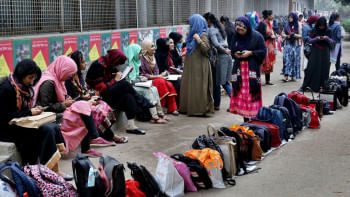Are our children and graduates ready for the future world?

The World Bank reported in 2017 that about one billion children around the world currently in primary schools are to partake in jobs in the future, that do not exist as of yet. Today, jobs in developing countries are mostly at risk due to automation and technological advancements, including Artificial Intelligence (AI). It has been reported that about 70 percent of India's IT jobs will become redundant within the next couple of years. India, the powerhouse of global IT outsources and office process-related work, will feel the heat of AI development. China will face a similar fate with 77 percent of jobs likely at risk of automation and AI in the next decade. If both India and China, two of the global economic giants, are to face this enormous challenge to develop their workforce to be relevant to the future, where does a country like Bangladesh stand in this discussion?
We do not know what types of jobs will be available in the next 15-20 years, when said children in primary education will graduate and enter the job market. However, what we can assess are the types of skills that will be relevant in the future world. The top three skills that have been identified are: creativity and problem-solving, emotional intelligence, and moral values and ethics. Irrespective of which university degree is pursued, or the results or country—if you do not possess these skills, you might be jobless. Unfortunately, we do not teach these skills to students at schools.
Very recently, the Bangladesh government adopted a new curriculum where some of these skills are incorporated after years of consultation and influence from concerned groups. Primary level schooling is the most important phase for the overall development of a child. Interestingly, it is also the most neglected phase in our country. The quality of education has been left wanting, with a significant percentage of students lacking grade-level competence in Bengali and 70 percent in mathematics—70 percent of 4th grade students can read Bengali properly whereas just eight percent of the 3rd graders can read English beyond the textbook. Although children at primary schools are receiving new curricula and books, teachers, who are the key to delivering the promise of creating a skilled future generation, are yet to be fully trained on the new methodology.
Bangladeshi students will be competing with international students for jobs in Bangladesh. This is already happening in our country. In companies including garment industries, Indians and Sri Lankans are employed because the skills that are required for those positions cannot be occupied by the local market. The foreign workers are usurping $10 billion out of the country as salary. Local businessmen and entrepreneurs are not hiring or promoting their existing workforce to those roles, as the local workforce is simply not capable for these positions. Because of student's underperformance at the foundational level nationally, the country fails to produce high-quality human resources.
Study establishes that it will take another 100 years for Bangladeshi students to catch up the skill-gap with Australian students if we continue with the same pace of improvement and if Australian standards remain stagnant. Unless our educational quality improves, we will not be at par with the human resources of developed countries and our students will not be able to compete at the international level so that Bangladeshi youths can work in organisations such as NASA, Facebook, Google etc.
There is no shortcut other than a complete revamp of the education system—especially the primary level for Bangladesh. We need a system that focuses on actual learning, that allows individual students to reach their true potential. Only then students can transcend this system to acquire skills relevant to the future that we cannot grasp yet. Teachers help children to learn, so you have to have good teachers to have good schools and a good education system. All the countries that are best in education also have the best teachers in the world. Coincidence? No.
Teaching itself is a creative profession and also a demanding one that requires a certain level of professional skills. Majority of our primary-level teachers from both the government and private sector never go through any type of professional skill development training. This is not the teacher community's fault that they are not properly trained. Rather the system is guilty of not emphasising the professional capacity of teachers. Unless we put more value on teacher's development as a country or society, we cannot expect to have a good education system in our country. Every year, more than a million youth enter the workforce. In 2024, we could not accommodate them in the job sector—30-40 percent of youth remain unemployed. Imagine if this unemployment trend continues and the current jobs are getting replaced, what will happen to the future of this country?
Waliullah Bhuiyan is the founder of Light of Hope Ltd.
Views expressed in this article are author's own.
Follow The Daily Star Opinion on Facebook for the latest opinions, commentaries and analyses by experts and professionals. To contribute your article or letter to The Daily Star Opinion, see our guidelines for submission.

 For all latest news, follow The Daily Star's Google News channel.
For all latest news, follow The Daily Star's Google News channel. 









Comments